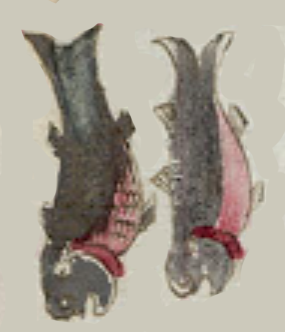michin (CST33)
This painting of the simplex glyph for the term michin (fish) shows two vertical, parallel fish facing downward. They are multicolored, mostly gray, with pink bellies and red gills. Their mouths are open. The companion text explains that six arrobas (a Spanish loanword for a measure of about 25 pounds) were purchased for consumption by members of the royal Indigenous palace and by the vicar in the church. The cost was 18 pesos.
Stephanie Wood
For more on the Codex Sierra, see Kevin Terraciano’s study (2021), especially pp. 120 (for the Nahuatl transcription) and 155 (for the English translation).
Stephanie Wood
1550–1564
Jeff Haskett-Wood
pescado, peces, comida, jerarquía social

michin, fish, https://nahuatl.wired-humanities.org/content/michin
pescado
Stephanie Wood
Códice Sierra-Texupan, plate 33, page dated 1560. Origin: Santa Catalina Texupan, Mixteca Alta, State of Oaxaca. Kevin Terraciano has published an outstanding study of this manuscript (Codex Sierra, 2021), and in his book he refers to alphabetic and “pictorial” writing, not hieroglyphic writing. We are still counting some of the imagery from this source as hieroglyphic writing, but we are also including examples of “iconography” where the images verge on European style illustrations or scenes showing activities. We have this iconography category so that such images can be fruitfully compared with hieroglyphs. Hieroglyphic writing was evolving as a result of the influence of European illustrations, and even alphabetic writing impacted it.
https://bidilaf.buap.mx/objeto.xql?id=48281&busqueda=Texupan&action=search
The Biblioteca Digital Lafragua of the Biblioteca Histórica José María Lafragua in Puebla, Mexico, publishes this Códice Sierra-Texupan, 1550–1564 (62pp., 30.7 x 21.8 cm.), referring to it as being in the “Public Domain.” This image is published here under a Creative Commons license, asking that you cite the Biblioteca Digital Lafragua and this Visual Lexicon of Aztec Hieroglyphs.






